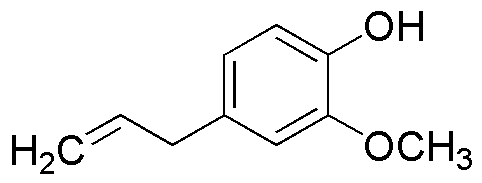Eugenol is widely utilized in research focused on various practical applications across multiple industries. Here are five key uses:
- Flavoring Agent: Commonly used in the food industry, eugenol imparts a clove-like flavor to products such as baked goods, candies, and beverages, enhancing taste while being recognized as safe for consumption.
- Fragrance Component: In the cosmetics and personal care industry, eugenol serves as a natural fragrance in perfumes, soaps, and lotions, providing a pleasant aroma while appealing to consumers seeking natural ingredients.
- Antimicrobial Properties: Researchers utilize eugenol for its antimicrobial effects, making it valuable in developing natural preservatives for food and cosmetics, helping to extend shelf life without synthetic additives.
- Dental Applications: In dentistry, eugenol is used in dental cements and as a pain-relieving agent, providing effective temporary relief for toothaches and sensitivity, which is particularly beneficial for patients seeking immediate comfort.
- Pharmaceutical Uses: Eugenol is explored in pharmaceutical formulations for its anti-inflammatory and analgesic properties, offering potential benefits in pain management and treatment of various conditions.
General Information
Properties
Safety and Regulations
Applications
Eugenol is widely utilized in research focused on various practical applications across multiple industries. Here are five key uses:
- Flavoring Agent: Commonly used in the food industry, eugenol imparts a clove-like flavor to products such as baked goods, candies, and beverages, enhancing taste while being recognized as safe for consumption.
- Fragrance Component: In the cosmetics and personal care industry, eugenol serves as a natural fragrance in perfumes, soaps, and lotions, providing a pleasant aroma while appealing to consumers seeking natural ingredients.
- Antimicrobial Properties: Researchers utilize eugenol for its antimicrobial effects, making it valuable in developing natural preservatives for food and cosmetics, helping to extend shelf life without synthetic additives.
- Dental Applications: In dentistry, eugenol is used in dental cements and as a pain-relieving agent, providing effective temporary relief for toothaches and sensitivity, which is particularly beneficial for patients seeking immediate comfort.
- Pharmaceutical Uses: Eugenol is explored in pharmaceutical formulations for its anti-inflammatory and analgesic properties, offering potential benefits in pain management and treatment of various conditions.
Documents
Safety Data Sheets (SDS)
The SDS provides comprehensive safety information on handling, storage, and disposal of the product.
Product Specification (PS)
The PS provides a comprehensive breakdown of the product’s properties, including chemical composition, physical state, purity, and storage requirements. It also details acceptable quality ranges and the product's intended applications.
Certificates of Analysis (COA)
Search for Certificates of Analysis (COA) by entering the products Lot Number. Lot and Batch Numbers can be found on a product’s label following the words ‘Lot’ or ‘Batch’.
*Catalog Number
*Lot Number
Certificates Of Origin (COO)
This COO confirms the country where the product was manufactured, and also details the materials and components used in it and whether it is derived from natural, synthetic, or other specific sources. This certificate may be required for customs, trade, and regulatory compliance.
*Catalog Number
*Lot Number
Safety Data Sheets (SDS)
The SDS provides comprehensive safety information on handling, storage, and disposal of the product.
DownloadProduct Specification (PS)
The PS provides a comprehensive breakdown of the product’s properties, including chemical composition, physical state, purity, and storage requirements. It also details acceptable quality ranges and the product's intended applications.
DownloadCertificates of Analysis (COA)
Search for Certificates of Analysis (COA) by entering the products Lot Number. Lot and Batch Numbers can be found on a product’s label following the words ‘Lot’ or ‘Batch’.
*Catalog Number
*Lot Number
Certificates Of Origin (COO)
This COO confirms the country where the product was manufactured, and also details the materials and components used in it and whether it is derived from natural, synthetic, or other specific sources. This certificate may be required for customs, trade, and regulatory compliance.

